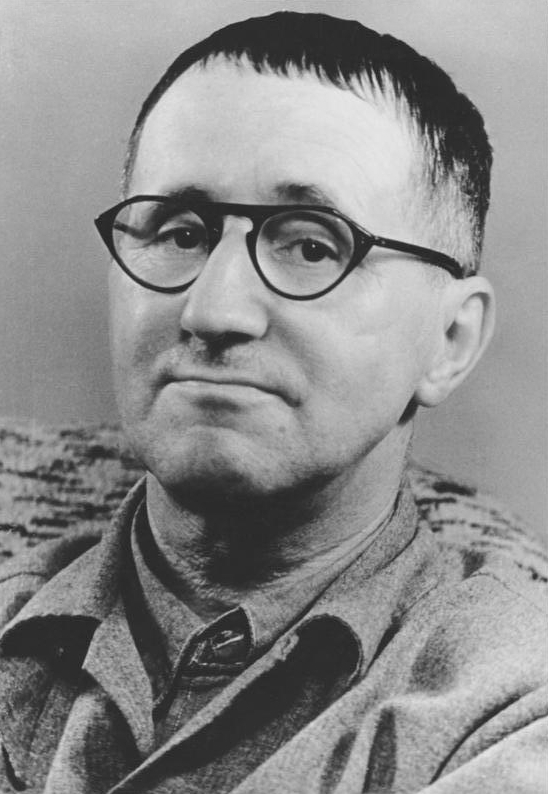Bertolt Brecht nejznámější citáty
Bertolt Brecht: Citáty o lásce
Bertolt Brecht: Citáty o lidech
Bertolt Brecht citáty a výroky

„Kdo nezná pravdu, je pouze hlupák, ale kdo ji zatajuje, je zločinec.“
Varianta: Kdo nepozná pravdu, je jenom hlupák, ale kdo ji zatajuje, je zločinec.



Bertolt Brecht: Citáty anglicky
“Unhappy is the land that needs a hero.”
Scene 12, p. 115
Variant translations: Pity the country that needs heroes.
Unhappy the land that is in need of heroes
Zdroj: Andrea: Unhappy is the land that breeds no hero.
Galileo: No, Andrea: Unhappy is the land that needs a hero. [Unglücklich das Land, das Helden nötig hat. ]
Zdroj: Poems 1913-1956
Zdroj: Brecht on Theatre: The Development of an Aesthetic
“To live means to finesse the processes to which one is subjugated.”
"Notes on Philosophy" in On Politics and Society (1941).
“Mixing one's wines may be a mistake, but old and new wisdom mix admirably.”
The Singer, in The Caucasian Chalk Circle (1944), Prologue
"Great hymn of thanksgiving" [Grosser Dankchoral] (1920) from The Devotions (1922-1927); trans. Karl Neumann in Poems, 1913-1956, p. 74
Poems, 1913-1956 (1976)
“What if they gave a war and no one came? Then the war will come to you.”
Amalgamation of Carl Sandburg's quote "Sometime they’ll give a war and nobody will come" with a sentence from Brecht's Koloman Wallisch Kantate: "When the people are disarmed / War will come" ("Wenn das Volk entwaffnet ist / Kommt der Krieg"). - Source http://www.cyberussr.com/hcunn/q-war-nobody-came.html
Misattributed
“But something's missing (Aber etwas fehlt).”
Jim[my] Mahoney, in Rise and Fall of the City of Mahagonny (1930)
"Of all the works of man" [Von allen Werken] (c. 1932) in Poems, 1913-1956, p. 192
Poems, 1913-1956 (1976)
“The more innocent they are, the more they deserve to be shot.”
On defendants in the Moscow Trials and on innocents betrayed by Communist Party members, as recounted by philosopher Sidney Hook, as quoted in Intellectuals (1990) by Paul Johnson, p. 190; though this might easily be interpreted as implying that anyone who had failed to conspire against Stalin deserved to be shot, Hook implies that he meant that the betrayal of innocents was justified. Henry Pachter is also quoted in Intellectuals as saying that Brecht had made similar remarks in his presence, and had added "Fifty years hence the communists will have forgotten Stalin, but I want to be sure that they will still read Brecht. Therefore I cannot separate myself from the Party."
"Questions from a worker who reads" [Fragen eines lesenden Arbeiters] (1935) from The Svendborg Poems (1939); trans. Michael Hamburger in Poems, 1913-1956, p. 252
Poems, 1913-1956 (1976)
“For once you must try not to shirk the facts:
Mankind is kept alive by bestial acts.”
"What Keeps Mankind Alive?" Act 2, sc. 6
The Threepenny Opera (1928)
“Come in, dear wind, and be our guest
You too have neither home nor rest.”
"Christmas legend" [Weinachtslegende] (1923) Berliner Börsen-Courier (25 December 1924); trans in Poems, 1913-1956, p. 100
Poems, 1913-1956 (1976)
“Come fishing with me, said the fisherman to the worm.”
Komm, geh mit angeln, sagte der Fischer zum Wurm.
Mutter Courage to the army recruiter when he tries to recruit her son in Scene 1
Mother Courage and Her Children (1939)
"Song of the cut-price poets" [Lied der preiswerten Lyriker] (1927/1933) from Songs Poems Choruses (1934); in Poems, 1913-1956, p. 161
Poems, 1913-1956 (1976)
“For the task assigned them
Men aren't smart enough or sly
Any rogue can blind them
With a clever lie.”
Polly Peachum, in "The Song of the Futility of All Human Endeavor"; Act 3, scene 1, p. 75
The Threepenny Opera (1928)
"And I always thought" [Und ich dachte immer] (c. 1956), trans. Michael Hamburger in Poems, 1913-1956, p. 452
Poems, 1913-1956 (1976)



